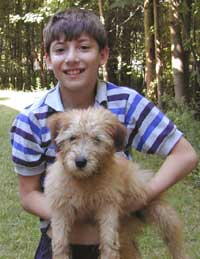
Nathan Pitkin and his dog Nayla
Dog walkers are out in the morning before the workday begins and again in the evening. Most have something in common. They carry a bag, usually a grocery bag or the long plastic sleeve in which newspapers are delivered. These conscientious pet owners take their waste-filled bags and put them in their household trash.
What about the not-so-conscientious pet owners? The Center for Watershed Protection refers to them as “bad dog walkers” and claims their numbers are 16 million in the United States.
Pet owners who violate the County’s pooper scooper law may incur a fine up to $250. Unfortunately, since 1999 not one summons was issued for such violations. That means the only deterrents to leaving pet waste on the ground may be our individual conscience and societal mores.
Pet waste left on the grass or in the woods makes its way to storm drains every time it rains. Storm drains lead to lakes or streams that ultimately lead to the Occoquan Reservoir and the Potomac Rivers, our drinking water supply. Pet waste may carry disease-causing organisms, which make water unsafe for swimming and more costly to treat for drinking.
Dog waste on the ground is ugly and messy. It pollutes our environment even if it is hidden in the bushes, under leaves or in the woods. Please pick up after your pets. Our health may depend on it.
Please Remember: Scoop the Poop!
 Pet waste is a subject everyone likes to avoid, although we at the Northern Virginia Soil and Water Conservation District like to bring it up often.
Pet waste is a subject everyone likes to avoid, although we at the Northern Virginia Soil and Water Conservation District like to bring it up often.
Pet waste is ugly and smelly. But even worse, it poses a health risk to pets, bodies of water, and people. Pet waste left on sidewalks, streets, trails, and grassy areas is immediately flushed into the nearest waterway when it rains. Even if you can’t see the water near you, the pet waste goes into a storm drain where it travels untreated to your neighborhood stream or lake.
Like human waste, animal waste may contain harmful bacteria and viruses, making the receiving water unfit for drinking and recreation. In addition, pet waste contains nutrients that will accelerate the growth of nuisance algae.
What should Fairfax County residents do with animal waste?
Scoop it up and bag it with the rest of your household garbage.

